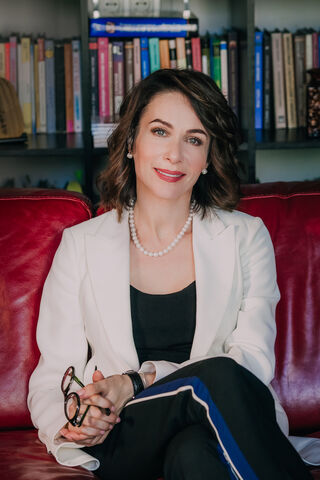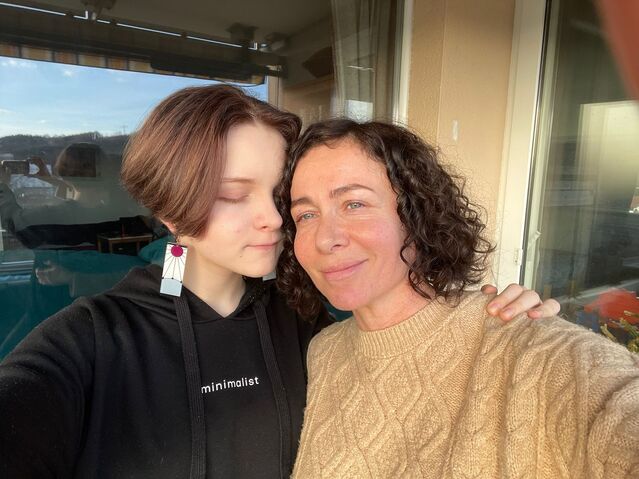Post-Traumatic Stress Disorder
Why a Psychologist Who Fled Ukraine Believes "What Is Yours Cannot Be Lost"
"PTSD is like a bomb which will destroy everything from the inside."
Posted March 17, 2022 Reviewed by Lybi Ma

Natalia Lomonosova is a well-known psychologist in Ukraine. An early local advocate of interventions from hypnotherapy to VR, she is a regular television commentator and a seasoned clinician.
Lomonosova is now a refugee living in Homburg, Germany with her 14-year-old daughter. She was taken in by a friend of a friend after a two-week odyssey across Europe, an escape as disorienting and incredible as “a Brothers Grimm fairy tale.”
Her journey, like that of millions of Ukrainians since February 24, is all too real. But as in many a parable, Lomonosova is profoundly changed. She now understands the bonds that spring up among strangers in crises, the power of starting anew, and the limits of psychotherapy in the face of life and death.
The following is my exchange with Lomonosova.
You created an online course called Transformation: The New Me one month ago. It was scheduled to launch on March 28.
Yes, this course is a fact and an improbability at the same time.
Now I think that all dreams come true, and you have to be careful what you wish for. My transformation happened in one of the most bloody and stressful ways. I really was “completely transformed and renewed” thanks to a war that I did not expect.
But now, the old skin has been shed, relationships that had become obsolete are complete, and a new life is ahead, though I have yet to figure it out.
Many want to change their lives, but perhaps no one in such a terrible way.
Psychologists on the Frontlines
How can psychologists help victims of this war?
The military and journalists are not the only ones fighting in Ukraine. Psychologists are now also “warriors of light” who will fight for the lives of those who survived under shelling.
PTSD is like a bomb brought home from the war, which will explode and destroy everything from the inside.
We are faced with an incredible mental crisis, of unprecedented magnitude and intractable consequences. We must use all scientifically proven methods to combat it. These include prolonged exposure therapy, hypnotherapy, and CBT. I also apply VR therapy in the treatment of phobias, anxiety disorders, and PTSD. As with many new technologies, I consider it an unexpected solution to an age-old problem.
Could any aspect of your own training prepare you for the current situation?
Yes. During the 2014 revolution in Ukraine, I well understood that psychologists would face the problem of trauma and PTSD. I began to study it intensively. The symptoms of PTSD include a heightened sense of justice, the search for conflict, memories that haunt you, sleep and eating disorders, instant and uncontrolled aggression, constant hypervigilance, and much more. In short, it is very dangerous.
We will be dealing with four types of PTSD: military, civilians-witnesses, refugees, and children. This will affect everyone.
Are mental health professionals currently able to provide care in Ukraine?
I am in contact with colleagues in Ukraine—some clinics give free medical advice online, as do some psychologists, myself included. But it will take time to organize the appropriate large-scale work with institutions, schools, and companies and to train specialists to work with trauma.
Psychologists in Ukraine simply need the help of colleagues from other countries to help them gain tools, techniques, and protocols for treating trauma, anxiety disorders, and PTSD.
Psychology is a science about people and for people. I know many who have spent thousands of dollars on their education and on years of self-therapy, and all for the sake of being more assertive and “raising one’s own stature?”
These are the requests we see now:
- How can I help a child if we are hiding in the basement and cannot run?
- What if I can't sleep?
- I think about my husband [fighting on the frontlines] all the time, how can I calm down?
- How can I stop being afraid?
Now it’s about service to other people. Roll up your sleeves. The time has come.
What do other countries need to know?
Ukrainian psychologists will need online training for those who will work with people in Ukraine, especially in PTSD. And people need to understand the psychology of refugees who are “starting a new life” while coping with the loss of home, relationships, health, loved ones, and relatives.
It is also important to take into account the guilt complex. Millions are now “wandering around Europe” tormented by feelings of compassion and helplessness towards their relatives who could not get out.
Psychology Works Only Within a Safe Framework
Did your training prepare you personally for the events of the last three weeks?
As an experienced psychologist, I thought that I was ready for anything.
But when I woke up at 5 a.m. from the first explosions, despite that I deal with anxiety disorders, I was in such a state of panic and horror that my consciousness narrowed to the minimum objective: Grab the child, run for cover, watch out for an air raid siren, run for cover. I couldn't think at all. You can't help yourself intellectually.
And you cannot help others when you yourself are at gunpoint or missiles are falling from the air. You must trust your body, which knows better how to save a life than does the mind.
I myself have spoken many times about the power of diaphragmatic breathing and progressive relaxation; meditations, mindfulness, and self-hypnosis, about training my fear. None of this works when your house is bombed. When you are on the border of life and death, other mechanisms are activated. Maybe if we were professional military, we would have learned how to maintain self-control in these conditions. But psychology is a peaceful profession—we did not prepare for war.
How did you escape?
From the first shelling, my daughter and I were sheltered in our basement by the Jewish community in a synagogue that is next to my home. On the third day of the war, a bus suddenly arrived. The rabbi told me and my daughter to run away with them. I declined. They gave me the keys to the synagogue and left. I was overcome with despair and horror, thinking that I was trapped and had missed my only chance to save my child, and that these things that I simply couldn’t believe were really happening.
I called the rabbi, who said that maybe there will be another bus, eventually. When it did arrive, my daughter and I quickly threw some things together and departed. We were taken under shelling to a synagogue in Chisinau, Moldova. We were taken in and sheltered by one of my clients. Others brought medicine and shoes—my daughter left in slippers, and we had gotten sick on the way. We were disoriented and had no money, but the most important thing was that my daughter was safe.
We took a bus with refugees to Prague, where another client sheltered us for a couple of days. However, it was impossible to stay there: the city is inundated with people. I was completely exhausted and uncertain where to go. Then, suddenly a friend of a friend called and invited us to come to her in Germany.
We all use habitual phrases, “Good morning” and “Good night." But only now do I truly understand their meaning. There is nothing more important in life than a good morning and a good night.

What Is Yours Cannot Be Lost
How do you imagine the future?
My first goal is to rebuild my online practice. It is impossible to take money from those who are suffering and in dire need of psychological help. But right now, I myself need to survive. I suggested to my Instagram audience that those who are safe and compassionate can pay for a consultation for those who are suffering and in need.
There is a saying among samurai: If you're going to use your sword at least once in your life, practice every day. And I practiced.
I can recover quickly. And when I can afford it, I will seek professional help. I will never forget the events of this war.
But now others are worse off than I am, and they need me. First of all, my daughter, I am her support, my clients, and of course, ordinary people in my country.
What do you know now that you could not have known three weeks ago?
All the way through Europe—my adventures felt like a Brothers Grimm fairy tale—I met incredible human support and help. We were literally passed from hand to hand by strangers. In a terrible and wonderful way at the same time, life taught me that the good actually keeps the world going. My faith in people and the power of good has only increased.
And now I know for sure that you can lose everything in an instant, but the main thing is not to lose yourself. What is yours cannot be lost: My experience, my knowledge, my love, my friendships, my faith, and my ability to survive. That's who I am, and as long as I'm alive, no one can take that away from me. I exist, and that is enough to live and help others.




